Dude! Take Your Turn!
A Gaming Life
Review – Furnace

There’s something about chains in games that is just so cool, even though they burn my brain sometimes.
I’m not talking about actual chains, of course. That would be terrible.
Unless you’re into that sort of thing, in which case who am I to judge?
But I’m talking about chaining abilities and cards so that one card feeds into another, which feeds into another, which feeds into another, until the whole world is destroyed by some long-forgotten ancient god or something.
Or, you know, you get tons of points.
Probably best to go for that second goal.
This is all a roundabout way to talk about a really cool auction/chaining card game called Furnace.
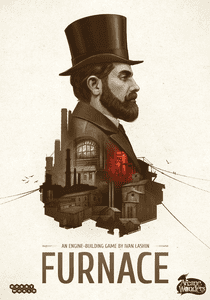
Furnace was designed by Ivan Lashin with artwork by Sergey Dulin, Marta Ivanova, Ilya Konovalov, Vadim Poluboyarov, Oleg Yurkov and Egor Zharkov.
It was published by Hobby World and Arcane Wonders, along with a host of other worldwide publishing companies, in 2020.
It plays 2-4 players, though the expansion (which I’ll review once I’ve played it more) adds a 5th player. It also has solo rules.
But the base game is 2-4 players.
What’s so special about Furnace?
It’s an auction game unlike almost any other auction game I can think of (which is where somebody comes in and points out an obvious other example that I’ve never heard of).
Let’s take a look under the hood and see what’s what.
First, your muffler appears to be shot. Also, your battery is very corroded. How did you get this car here?
Oh, wait, sorry. Wrong hood.
We’re talking about Furnace!
Players are industrialists trying to maximize their money by getting factories to their tableau, having them produce resources and or convert resources into other resources.
Or they might actually sell some goods too.
This is done over four rounds where players will be bidding on factories and then, after the auction is done, running all of their factories to gain benefits as efficiently as possible.

The really cool thing in this game is the auction mechanic where a row of factories is put out there for bidding (based on player count).
If that were all there was to it, then this would be a short (and highly negative) review.
Players have four auction discs, numbered 1-4, that they will alternate placing one of them on a card.
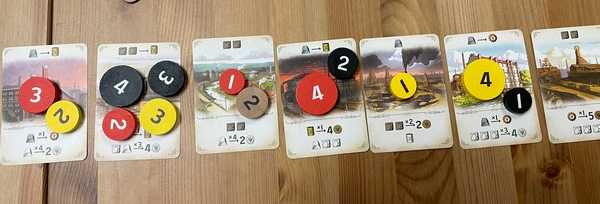
So far, so typical, right?
But here’s the extra icing on the cake that makes Furnace so delicious (if a bit smoky).
See what’s on the top of the cards?
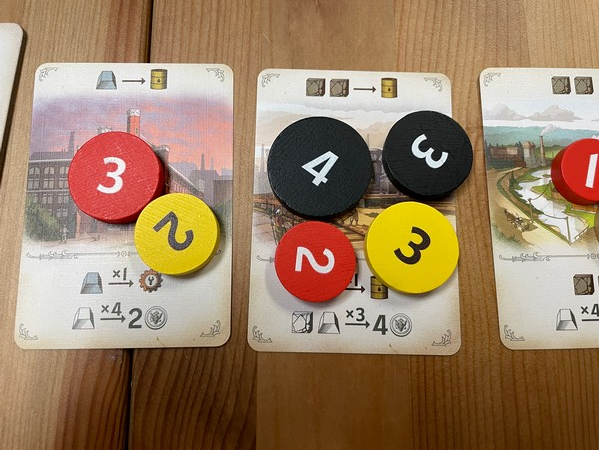
If you don’t have the highest bidding token on the card, you get compensation for your troubles.
You get whatever is on the top of the card, a number of times equal to your bidding value.
So red would get the card on the left, but yellow would get to convert one steel to one oil twice (since it was yellow’s “2” token).
The only rules for bidding are that you cannot have two of your own tokens on a card, and you cannot play a value that is already on the card. (As noted in the caption above, one of the industrialist powers, which I’ll talk about below, allows that player to break those rules).
This makes the auction very tactical.
Maybe you want that card for your tableau? Or maybe you don’t?
Maybe you just want the compensation for it because you want the two coal that it will give you (or four or six if you are using a higher token).
Sometimes you may underbid just because you’re hoping somebody will outbid you and you get the compensation.
But then the jerks don’t bid on it and you have to take the factory anyway.
How dare they!
But it’s so wonderful when somebody clearly wants a building, putting their “4” token out, leaving you free to put one of your lower tokens on it to get the resources or conversions.
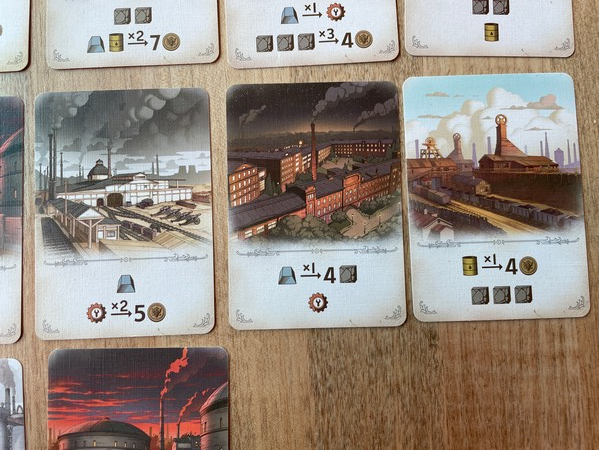
Gaining factories to your tableau and then running them after each round’s auction is where we get to the chaining aspect.
In the regular game, you can run your factories in any order, but each factory can only be run once per round.
So you do have to plan.
In the above picture, you have a bit of a choice (though there are more factories in my tableau than those three).
One factory lets you convert a steel to four coal and gives you an upgrade token. Another factory gives you a steel and lets you convert an upgrade token to 5 dollars (twice).
Which one do you run first? Do you need that coal for something else?
The upgrade token is also used to upgrade your factories using your starting factory (costing an upgrade token and a coal, pictured on the left below).
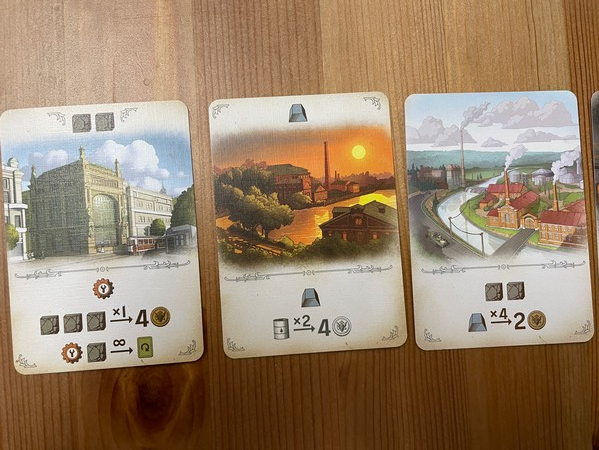
The factory on the right is already upgraded so gives you two effects (which you have to do in order, from top to bottom).
The factory in the middle isn’t upgraded. The second action is not active, though I love how the card shows you what it will be so you don’t have to flip it over to see.
One of the great graphic design decisions in this game.
There is a variant that’s in the rulebook, but which I haven’t played with yet, where you have to run your factories from left to right.
When you gain a factory, you have to decide where in the line it will be and then it must stay there.
I’ve seen it played and apparently it is actually quite good, but for me it would seem like it just adds analysis paralysis to the gaining factories phase rather than the “run your factories” phase.
Either way, analysis paralysis!
But it does make it much crunchier, I will give it that.
Each round, your tableau will get bigger and bigger, giving you more stuff to run, more conversions to make, and more sales to solicit for money.
After the first round, you won’t have gained very much money (which is points in this game, you don’t use money for anything).
After four rounds, your tableau could look like this.
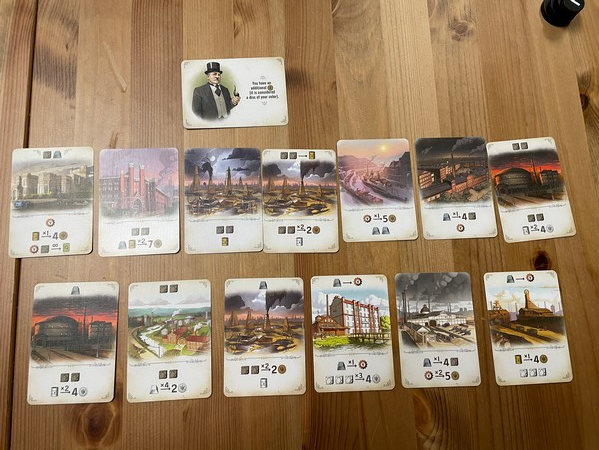
And you will have a lot of decisions to make (or you will have already made them if you’re playing the variant).
As with any of these games, having a touch of asymmetric powers is almost a requirement, and Furnace doesn’t disappoint in that respect.
Each player is dealt an industrialist that will give them some special power.
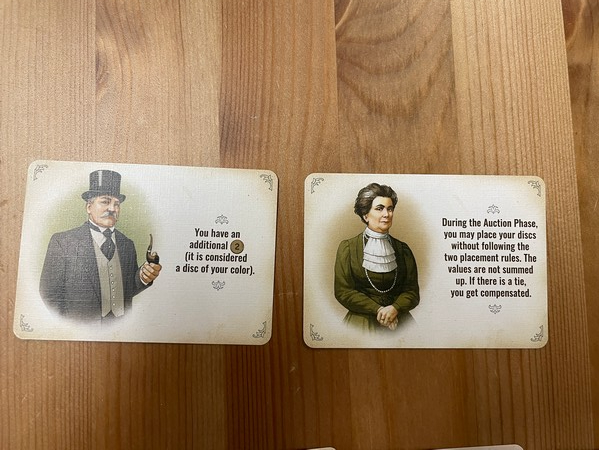
This adds some welcome variety to the game, as it will also guide you a little bit into how you want your factories to go.
But not really. They aren’t that powerful.
It’s just nice to be able to break the rules occasionally.
After four rounds, just count up all the money and whoever has the most wins (ain’t that the way of things?).
In the base game, you will see almost all of the cards (and you will see them all in a four-player game), so the randomness in the game is in which ones come out when.
It’s then your choice how you want to chain them all together, which is a much more difficult decision than many card games out there.
The auction mechanic just makes this game, though.
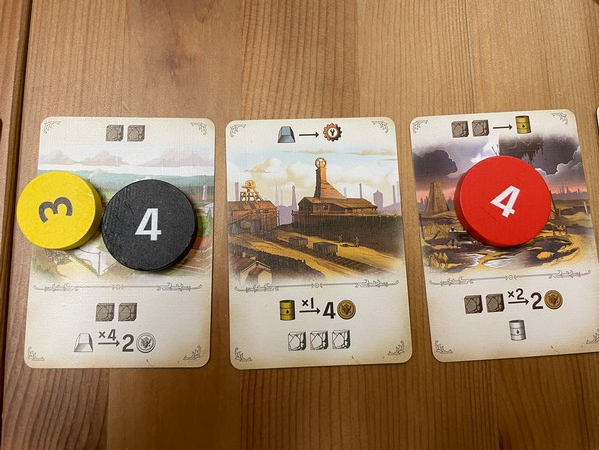
This is mainly because of the compensation aspect, where you can get benefits if you don’t win the card.
Which may be why you were bidding on it in the first place!
This game would be pretty boring without that mechanic.
The game breezes along at about a 45-60 minute pace, making it perfect for your work lunches.
You all play games on your lunch at work, right?
Anyway, while it’s certainly not a filler, it is a nice way to ease into a game day or cool down after a brain burning 3-hour game before heading for home.
Yet it’s a bit of a brain burner itself, so some people may not find it quite as relaxing as some other games that would fit the same time period.
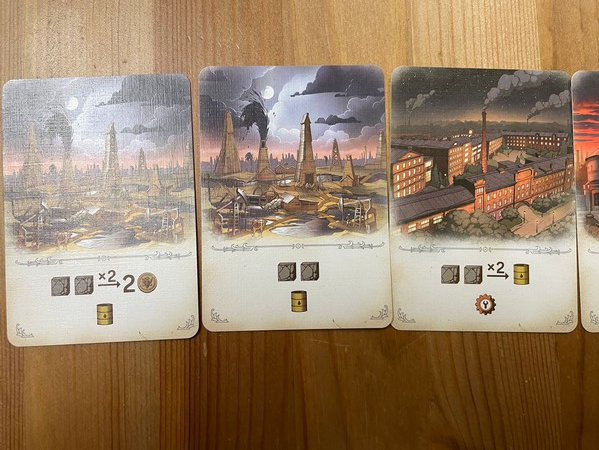
The production values in the game are also really good. The artwork on the cards really reflects the period of industrialism represented here, though the time period is kind of amorphous.
You can almost smell the smoke belching from the factories, or the oil gushing out of the…whatever you call those things.
(Editor: “Research? What’s that?”)
Furnace will appeal to many types of gamers. It’s been featured a couple of times on Heavy Cardboard, so I would definitely say that it’s not just for casual gamers.
In fact, I wouldn’t use this to introduce somebody to auction games that haven’t really played many games before.
But it’s just so juicy! I might feel tempted to try.
I just checked my list of games played that I used for this year’s Top 50 games played of all time, and Furnace is actually kind of far down on the list (still in the top 50%, though).
Now that I’ve played it a few times against this year (it had been a while when I did the original list), and now that I’ve played with the expansion once, I have a feeling it would be higher.
Either way, I highly recommend giving Furnace a try.
Even if you hate auction games.
This one’s definitely a keeper.
(Review written after 7 plays)
Nice review! I’ve not played a lot of auction games but the industry/business angle here sounds fun as well. Thanks for sharing this, as always. 🙂
LikeLiked by 1 person
Thanks, Zilla!
I appreciate the kind words. I think you’d like this one.
LikeLike
Great review! This looks intriguing – I’m always down for an interesting auction mechanism, and I guess the theme of heavy industry is a guilty pleasure of mine. Just curious that money is strictly used as VP – thematically, I’d rather expect it in a “spend VP to gain VP” way.
Anyway, I have to disappoint you when it comes to playing games during lunch break: I usually read a book!
LikeLiked by 1 person
Well, then we can’t be friends anymore 😛
I think you’d like this one!
LikeLiked by 1 person
Ditched for my love of reading! …and by you of all people!
LikeLiked by 1 person
LOL yes!
LikeLiked by 1 person